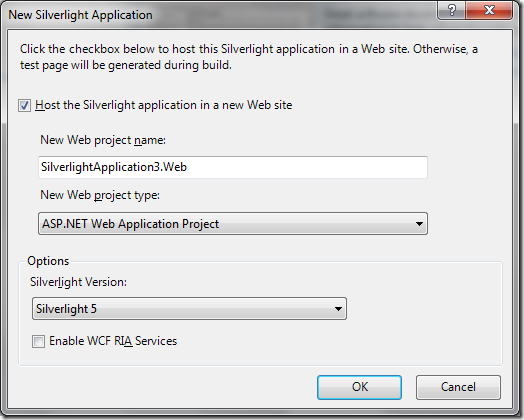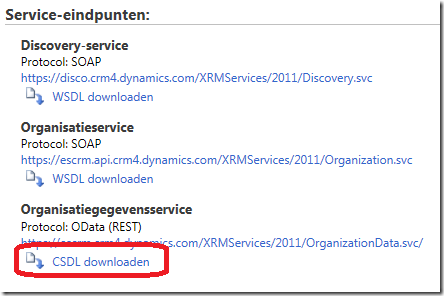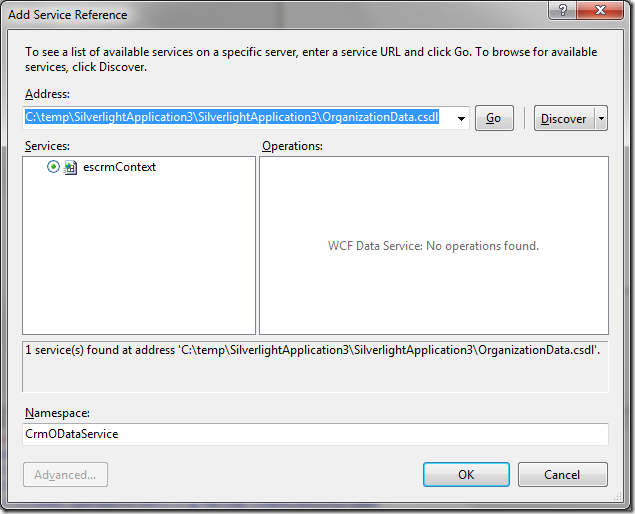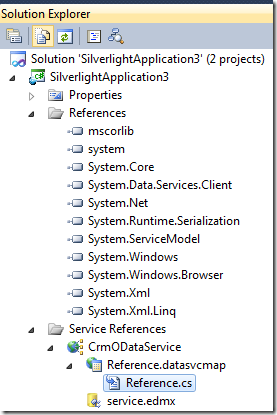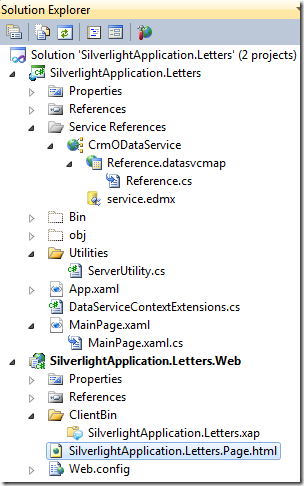MS CRM 2011 如何创建一个Silverlight 程序
原创地址:http://www.cnblogs.com/jfzhu/archive/2013/03/05/2943711.html
转载请注明出处
我在以前的文章中介绍过如何安装Silverlight插件,参见MS CRM 2011 为64位Outlook安装Silverlight。今天我们来创建一个简单的Silverlight程序,该程序显示出CRM中所有的active contacts。
1. 创建一个Silverlight Application
2. 生成 WCF Data Services Client Data Service Classes
CRM –> Settings –> Customizations –> Developer Resources .
Download Organization Data Service 的 CSDL
保存CSDL文件
3. 在Silverlight Application中添加 Service Reference
顺便提一下,如果在CRM customization中,某entity的name与该entity的某个field name相同,或者entity name 与某Relationship name相同的话,添加引用都会引起编译错误,所以在定制CRM的时候要注意,避免entity name与field name或者relationship name相同。
4. 在Silverlight Application 项目中添加 Reference System.Xml.Linq
5. 添加一个新类 DataServiceContextExtensions.cs
注意修改你的namespace和类名escrmContext,namespace应与Reference.cs的namepsace相同,escrmContext也应与Reference.cs中的DataServiceContext相同。
using System; using System.Linq; using System.Data.Services.Client; using System.Reflection; using System.Collections.Generic; using System.ComponentModel; using System.Collections.ObjectModel; using System.Xml.Linq; namespace SilverlightApplication3.CrmODataService { partial class escrmContext { #region Methods partial void OnContextCreated() { this.ReadingEntity += this.OnReadingEntity; this.WritingEntity += this.OnWritingEntity; } #endregion #region Event Handlers private void OnReadingEntity(object sender, ReadingWritingEntityEventArgs e) { ODataEntity entity = e.Entity as ODataEntity; if (null == entity) { return; } entity.ClearChangedProperties(); } private void OnWritingEntity(object sender, ReadingWritingEntityEventArgs e) { ODataEntity entity = e.Entity as ODataEntity; if (null == entity) { return; } entity.RemoveUnchangedProperties(e.Data); entity.ClearChangedProperties(); } #endregion } public abstract class ODataEntity { private readonly Collection<string> ChangedProperties = new Collection<string>(); public ODataEntity() { EventInfo info = this.GetType().GetEvent("PropertyChanged"); if (null != info) { PropertyChangedEventHandler method = new PropertyChangedEventHandler(this.OnEntityPropertyChanged); //Ensure that the method is not attached and reattach it info.RemoveEventHandler(this, method); info.AddEventHandler(this, method); } } #region Methods public void ClearChangedProperties() { this.ChangedProperties.Clear(); } internal void RemoveUnchangedProperties(XElement element) { const string AtomNamespace = "http://www.w3.org/2005/Atom"; const string DataServicesNamespace = "http://schemas.microsoft.com/ado/2007/08/dataservices"; const string DataServicesMetadataNamespace = DataServicesNamespace + "/metadata"; if (null == element) { throw new ArgumentNullException("element"); } List<XElement> properties = (from c in element.Elements(XName.Get("content", AtomNamespace) ).Elements(XName.Get("properties", DataServicesMetadataNamespace)).Elements() select c).ToList(); foreach (XElement property in properties) { if (!this.ChangedProperties.Contains(property.Name.LocalName)) { property.Remove(); } } } private void OnEntityPropertyChanged(object sender, System.ComponentModel.PropertyChangedEventArgs e) { if (!this.ChangedProperties.Contains(e.PropertyName)) { this.ChangedProperties.Add(e.PropertyName); } } #endregion } }
6. 将Reference.cs中的“: global::System.ComponentModel.INotifyPropertyChanged”替换为“: ODataEntity, global::System.ComponentModel.INotifyPropertyChanged”
7. 在Silverlight Application项目中添加Utilities Folder,并添加新类ServerUtility.cs
using System; using System.Windows.Browser; namespace SilverlightApplication3.Utilities { public static class ServerUtility { /// <summary> /// Returns the ServerUrl from Microsoft Dynamics CRM /// </summary> /// <returns>String representing the ServerUrl or String.Empty if not found.</returns> public static String GetServerUrl() { String serverUrl = String.Empty; //Try to get the ServerUrl from the Xrm.Page object serverUrl = GetServerUrlFromContext(); return serverUrl; } /// <summary> /// Attempts to retrieve the ServerUrl from the Xrm.Page object /// </summary> /// <returns></returns> private static String GetServerUrlFromContext() { try { // If the Silverlight is in a form, this will get the server url ScriptObject xrm = (ScriptObject)HtmlPage.Window.GetProperty("Xrm"); ScriptObject page = (ScriptObject)xrm.GetProperty("Page"); ScriptObject pageContext = (ScriptObject)page.GetProperty("context"); String serverUrl = (String)pageContext.Invoke("getServerUrl"); //The trailing forward slash character from CRM Online needs to be removed. if (serverUrl.EndsWith("/")) { serverUrl = serverUrl.Substring(0, serverUrl.Length - 1); } return serverUrl; } catch { return String.Empty; } } } }
8. 删除Silverlight Application Web项目中的.aspx文件
9. 删除Silverlight Application Web项目中的Silverlight.js文件
10. 打开Silverlight Application Web项目中的.html文件, 修改style silverlightControlHost
#silverlightControlHost
{
height: 100%;
width: 100%;
text-align: center;
}
删除对 Silverlight.js的引用 <script type="text/javascript" src="Silverlight.js"></script>
添加引用<script src="ClientGlobalContext.js.aspx" type="text/javascript"></script>
如果你上传到CRM中的web resource 的名为 new_/testpage.html,那么你的引用就为
<script src="../ClientGlobalContext.js.aspx" type="text/javascript"></script>
假如你要上传的html web resource为new_testpage.html,xap web resource 为 new_testsilverlight.xap,将object tag修改为
<param name="source" value="new_testsilverlight.xap"/>
11. 至此项目的创建工作就基本完成了
12. 下面来完成在DataGrid中显示所有的active contacts
MainPage.xaml代码如下:
<UserControl xmlns:sdk="http://schemas.microsoft.com/winfx/2006/xaml/presentation/sdk" x:Class="SilverlightApplication3.MainPage" xmlns="http://schemas.microsoft.com/winfx/2006/xaml/presentation" xmlns:x="http://schemas.microsoft.com/winfx/2006/xaml" xmlns:d="http://schemas.microsoft.com/expression/blend/2008" xmlns:mc="http://schemas.openxmlformats.org/markup-compatibility/2006" xmlns:local="clr-namespace:SilverlightApplication3" mc:Ignorable="d" d:DesignHeight="300" d:DesignWidth="400"> <UserControl.Resources> <local:YesNoValueConverter x:Key="myYesNoValueConverter"/> <local:GenderCodeConverter x:Key="myGenderCodeConverter"/> </UserControl.Resources> <Grid x:Name="LayoutRoot" Background="White"> <StackPanel x:Name="MessagePanel" VerticalAlignment="Top" /> <sdk:DataGrid x:Name="myDataGrid" AutoGenerateColumns="False" IsReadOnly="True" > <sdk:DataGrid.Columns> <sdk:DataGridTextColumn x:Name="FirstNameColumn" Header="First Name" Binding="{Binding FirstName, Mode=OneTime}" /> <sdk:DataGridTextColumn x:Name="LastNameColumn" Header="Last Name" Binding="{Binding LastName, Mode=OneTime}" /> <sdk:DataGridTextColumn x:Name="DoNotEmailColumn" Header="Do Not Email" Binding="{Binding DoNotEMail, Mode=OneTime, Converter={StaticResource myYesNoValueConverter}}" /> <sdk:DataGridTextColumn x:Name="ExchangeRateColumn" Header="Exchange Rate" Binding="{Binding ExchangeRate, Mode=OneTime, StringFormat=\{0:n2\}}" /> <sdk:DataGridTextColumn x:Name="BirthDateColumn" Header="Birth Date" Binding="{Binding BirthDate, Mode=OneTime, StringFormat=\{0:MM/dd/yyyy\}}" /> <sdk:DataGridTextColumn x:Name="GenderCodeColumn" Header="Gender" Binding="{Binding Path=GenderCode.Value, Mode=OneTime, Converter={StaticResource myGenderCodeConverter}}" /> <sdk:DataGridTextColumn x:Name="ParentColumn" Header="Parent Customer" Binding="{Binding Path=ParentCustomerId.Name, Mode=OneTime}" /> </sdk:DataGrid.Columns> </sdk:DataGrid> </Grid> </UserControl>
MainPage.xaml.cs代码如下:
using System; using System.Data.Services.Client; using System.Linq; using System.Threading; using System.Windows.Controls; using SilverlightApplication2.CrmODataService; using SilverlightApplication2.Utilities; using System.Windows.Data; namespace SilverlightApplication3 { public partial class MainPage : UserControl { private SynchronizationContext _syncContext; private escrmContext _context; private String _serverUrl; public MainPage() { InitializeComponent(); //Keeps a reference to the UI thread _syncContext = SynchronizationContext.Current; //Get the ServerUrl (ServerUrl is formatted differently OnPremise than OnLine) _serverUrl = ServerUtility.GetServerUrl(); if (!String.IsNullOrEmpty(_serverUrl)) { //Setup Context _context = new escrmContext(new Uri(String.Format("{0}/xrmservices/2011/organizationdata.svc/", _serverUrl), UriKind.Absolute)); //This is important because if the entity has new //attributes added the code will fail. _context.IgnoreMissingProperties = true; SearchContacts(); } else { //No ServerUrl was found. Display message. MessagePanel.Children.Add(new TextBlock() { Text = "Unable to access server url. Launch this Silverlight " + "Web Resource from a CRM Form OR host it in a valid " + "HTML Web Resource with a " + "<script src='ClientGlobalContext.js.aspx' " + "type='text/javascript'></script>" }); } } private void SearchContacts() { DataServiceQuery<Contact> query = (DataServiceQuery<Contact>)_context.ContactSet.Where(x => x.StateCode.Value.Value == 0); query.BeginExecute(OnContactSearchComplete, query); } private void OnContactSearchComplete(IAsyncResult result) { try { //Get the original query back from the result. DataServiceQuery<Contact> query = result.AsyncState as DataServiceQuery<Contact>; this.myDataGrid.ItemsSource = new DataServiceCollection<Contact>(query.EndExecute(result)); } catch (SystemException se) { _syncContext.Send(new SendOrPostCallback(showErrorDetails), se); } } private void showErrorDetails(object ex) { //Assure the control is visible MessagePanel.Visibility = System.Windows.Visibility.Visible; Exception exception = (Exception)ex; String type = exception.GetType().ToString(); MessagePanel.Children.Add(new TextBlock() { Text = String.Format("{0} Message: {1}", type, exception.Message) }); MessagePanel.Children.Add(new TextBlock() { Text = String.Format("Stack: {0}", exception.StackTrace) }); if (exception.InnerException != null) { String exceptType = exception.InnerException.GetType().ToString(); MessagePanel.Children.Add(new TextBlock() { Text = String.Format("InnerException: {0} : {1}", exceptType, exception.InnerException.Message) }); } } } public class YesNoValueConverter : IValueConverter { public object Convert(object value, Type targetType, object parameter, System.Globalization.CultureInfo culture) { bool isYes = bool.Parse(value.ToString()); if (isYes) return "Yes"; else return "No"; } public object ConvertBack(object value, Type targetType, object parameter, System.Globalization.CultureInfo culture) { string boolText = value.ToString().ToLower(); if (boolText == "yes") return true; else if (boolText == "no") return false; else throw new InvalidOperationException("Please enter 'yes' or 'no'."); } } public class GenderCodeConverter : IValueConverter { public object Convert(object value, Type targetType, object parameter, System.Globalization.CultureInfo culture) { if (value == null) return ""; int gendercode = int.Parse(value.ToString()); if (gendercode == 1) return "Male"; else if (gendercode == 2) return "Female"; else if (gendercode == 3) return "Unknown"; else return "null"; } public object ConvertBack(object value, Type targetType, object parameter, System.Globalization.CultureInfo culture) { return null; } } }
在上面的代码中,在DataGrid中分别显示了不同种类的field,包括Single Line Text, Two Options, decimal, OptionSet, DateTime,以及lookup。对 Two Options和OptionSet使用了Converter,当然其实对于获取GenderCode的Label应该去读取Metadata;对decimal和DateTime使用了StringFormat。
最后看一下效果截图:
总结:本文演示了如何为CRM创建一个Silverlight程序,并且如何将contact 的不同种类的field bind到DataGrid中。





